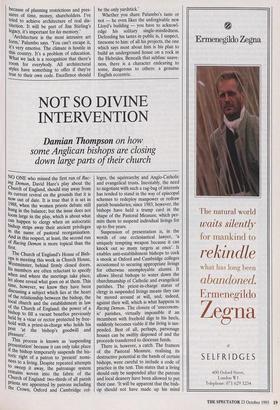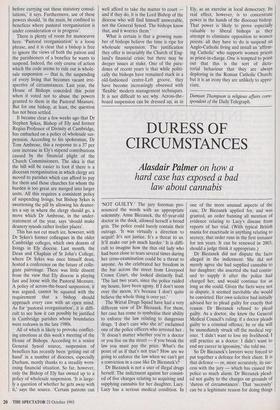NOT SO DIVINE INTERVENTION
Damian Thompson on how
some Anglican bishops are closing down large parts of their church
NO ONE who missed the first run of Rac- ing Demon, David Hare's play about the Church of England, should stay away from its current revival on the grounds that it is now out of date. It is true that it is set in ,1988, when the women priests debate still hung in the balance; but the issue does not loom large in the play, which is about what can happen to clergy when an autocratic l)ishop strips away their ancient privileges in the name of pastoral reorganisation. And in this respect, at least, the second run of Racing Demon is more topical than the first.
The Church of England's House of Bish- ops is meeting this week in Church House, Westminster, behind firmly closed doors. Its members are often reluctant to specify when and where the meetings take place, let alone reveal what goes on at them. This time, however, we know they have been discussing a subject which lies at the heart of the relationship between the bishop, the local church and the establishment in law of the Church of England: the power of a bishop to fill a vacant benefice previously held by a vicar or rector protected by free- hold with a priest-in-charge who holds his Post 'at the bishop's goodwill and Pleasure'.
This process is known as 'suspending presentation' because it can only take place if the bishop temporarily suspends the his- toric right of a patron to 'present' nomi- nees to a living. Despite repeated attempts t° sweep it away, the patronage system remains woven into the fabric of the Church of England: two-thirds of all parish priests are appointed by patrons including the Crown, Oxford and Cambridge col- leges, the squirearchy and Anglo-Catholic and evangelical trusts. Inevitably, the need to negotiate with such a rag-bag of interests has tended to stand in the way of episcopal schemes to redeploy manpower or redraw parish boundaries; since 1983, however, the bishops have held a trump card in the shape of the Pastoral Measure, which per- mits them to suspend individual livings for up to five years. Suspension of presentation is, in the words of one ecclesiastical lawyer, 'a uniquely tempting weapon because it can knock out so many targets at once'. It enables anti-establishment bishops to cock a snook at Oxford and Cambridge colleges accustomed to securing appropriate livings for otherwise unemployable alumni. It allows liberal bishops to water down the churchmanship of Catholic and evangelical parishes. The priest-in-charge status of clergy in suspended livings means they can be moved around at will, and, indeed, against their will, which is what happens in Racing Demon. The closure of 'uneconom- ic' parishes, virtually impossible if an incumbent with freehold digs in his heels, suddenly becomes viable if the living is sus- pended. Best of all, perhaps, parsonage houses can be swiftly disposed of and the proceeds transferred to diocesan funds. There is, however, a catch. The framers of the Pastoral Measure, realising its destructive potential in the hands of certain bishops, were careful to include a code of practice in the text. This states that a living should only be suspended after the patrons and local deanery have been allowed to put their case. `It will be apparent that the bish- op should not have made up his mind before carrying out these statutory consul- tations,' it says. Furthermore, use of these powers should, 'in the main, be confined to benefices where pastoral reorganisation is under consideration or in progress'.
There is plenty of room for manoeuvre here. 'Pastoral reorganisation' is a loose phrase, and it is clear that a bishop is free to ignore the views of both the patron and the parishioners of a benefice he wants to suspend. Indeed, the only course of action which the code seems to rule out is whole- sale suspension — that is, the suspending of every living that becomes vacant irre- spective of circumstances. Last year, the House of Bishops conceded this point when it voted not to abuse the powers granted to them in the Pastoral Measure. But for one bishop, at least, the question has not been settled.
It became clear a few weeks ago that Dr Stephen Sykes, Bishop of Ely and former Regius Professor of Divinity at Cambridge, has embarked on a policy of wholesale sus- pension. According to his spokesman, Dr Tom Ambrose, this a response to a 37 per cent increase in Ely's stipend contributions caused by the financial plight of the Church Commissioners. The idea is that the bill will be easier to foot if there is a diocesan reorganisation in which clergy are moved to parishes which can afford to pay for them and those churches for whom the burden is too great are merged into larger units. All this requires a consistent policy of suspending livings; but Bishop Sykes is sweetening the pill by allowing his deaner- ies a say in where the clergy should go, a move which Dr Ambrose, in the under- statement of the year, says 'should make deanery synods rather livelier places'.
This has not cut much ice, however, with Dr Sykes's former colleagues in the older Cambridge colleges, which own dozens of livings in Ely diocese. Last month, the Dean and Chaplain of St John's College, where Dr Sykes was once himself dean, hosted a conference on the future of colle- giate patronage. There was little dissent from the view that Ely diocese is playing fast and loose with the Pastoral Measure. A policy of across-the-board suspension, it was argued, cannot be squared with the requirement that a bishop should approach every case with an open mind. As for 'pastoral reorganisation', it is diffi- cult to see how it can possibly be justified in Cambridge parishes whose boundaries were redrawn in the late 1980s.
All of which is likely to provoke conflict- ing emotions at this week's meeting of the House of Bishops. According to a senior General Synod source, suspension of benefices has recently been 'getting out of hand' in a number of dioceses, especially Durham, mostly thanks to a steadily wors- ening financial situation. So far, however, only the Bishop of Ely has owned up to a policy of wholesale suspension. 'It is large- ly a question of whether he gets away with it,' says the source. 'Certain patrons can
well afford to take the matter to court and if they do, it is the Lord Bishop of the diocese who will find himself answerable, not the General Synod. The bishops know that, and it worries them.'
What is certain is that a growing num- ber of bishops believe the time is ripe for wholesale suspension. The justification they offer is invariably the Church of Eng- land's financial crisis; but there may be deeper issues at stake. One of the para- doxes of recent years is that while politi- cally the bishops have remained stuck in a old-fashioned centre-Left groove, they have become increasingly obsessed with `flexible' modern management techniques. It is not difficult to see why. Across-the- board suspension can be dressed up, as in Ely, as an exercise in local democracy. Its real effect, however, is to concentrate power in the hands of the diocesan bishop. That power is likely to prove especially valuable to liberal bishops as they attempt to eliminate opposition to women priests: all they have to do is suspend an Anglo-Catholic living and install an 'affirm- ing Catholic' who supports women priests as priest-in-charge. One is tempted to point out that this is the sort of dicta- torial behaviour that they are always deploring in the Roman Catholic Church; but it is an irony they are unlikely to appre- ciate.
Damian Thompson is religious affairs corre- spondent of the Daily Telegraph.



































































 Previous page
Previous page